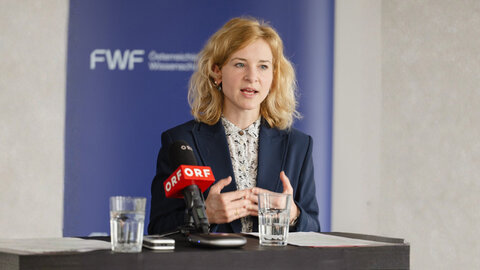FWF Publishes Sustainability Strategy: Three Pillars for Sustainable Research Funding

The FWF is sending out a strong signal for sustainable research: With its new Sustainability Strategy, the FWF is pursuing the goal of systematically anchoring sustainability in the funding system and its own day-today work, as well as through the targeted support of thematic projects. The strategy is based on three key pillars: the sustainable implementation of FWF projects, sustainable working practices at the FWF Office, and the targeted funding of projects on sustainability issues with funds from the alpha+ Foundation.
“As a key organization for the funding of basic research, it is our job not only to enable excellent research, but to take responsibility for the conditions surrounding research work as well. With our Sustainability Strategy, we are consciously creating incentives to reflect on research practices and to actively shape change – in the application process, in day-to-day research, and in administration,” says FWF President Christof Gattringer.
Sustainable implementation of FWF projects
Every year, the FWF supports several hundred research projects in Austria. Now, these projects are to be planned and conducted with an even greater emphasis on sustainability. The FWF is working closely with universities and non-university research institutions to jointly establish minimum standards for sustainable research practices. Starting in the fall of 2025, researchers applying for funding will be required to submit a sustainability statement with their proposal. Applicants in the Principal Investigator Projects, Principal Investigator Projects International, and Clinical Research programs will be asked to reflect on the extent to which aspects such as experimental design, project design, travel, use of resources, or use of equipment in the research process can be made more sustainable. As a first step, this measure serves to raise awareness. After completion and evaluation of the initial pilot phase, it will also be incorporated into the peer-review process.
Sustainable working practices at the FWF Office
The FWF is also committed to sustainability in its day-to-day work. The FWF Office has already implemented or is currently developing measures in areas such as mobility, energy consumption, waste management, and procurement. Jury and committee meetings are increasingly being restructured to conserve resources, for example through virtual or hybrid formats, optimized travel planning, and digital documents. Measures are evaluated on a continuous basis and adapted to suit new developments.
Funding research on sustainability
As most FWF funding programs are thematically open, sustainability-related topics can be submitted in almost all of them. The FWF is also involved in European partnerships and uses philanthropic funding to provide targeted support for sustainability issues, for example with the Zero Emissions Award, Austria's largest private funding award for climate-relevant basic research.
Research as the key to a sustainable future
Sustainability is not only a strategic goal for the FWF, but also a mandate for science. Research can contribute to solving key ecological, social, and economic challenges – be it through new findings, interdisciplinary approaches, or sustainable practice. The FWF takes a holistic approach to sustainability, which is reflected in the funding system, in its own actions, and in subject-specific initiatives. As co-author of the Heidelberg Agreement, the FWF is also committed to strengthening the emphasis on environmental sustainability in research funding at the European level.





